After more than 15 years of teaching in Philadelphia and Detroit, Leslie Piper thought she’d seen everything. Then she got a $26,000 raise.
She’d gotten married and moved to Detroit from Philadelphia in 2015, only to find that her salary was stuck at the same level as teachers with only two years in the classroom. The district’s contract with teachers did not recognize the experience that new arrivals brought with them.
When that changed earlier this year, Piper’s salary jumped to $67,223, the top rate for teachers with master’s degrees.
“When my salary quantum leaped the way it did, I felt a breath of relief,” she said on Thursday. “And I thought, I’m really going to roll my sleeves up and go into my job full throttle without thinking, ‘oh, gosh, I have to pay my cable bill, I have to pay my credit card bill.’”
She’s far from alone. Hundreds of teachers in the Detroit district saw their pay shoot up by more than 10 percent this year. On the whole, teachers who appear on the district’s payroll in both June 2017 and October 2018 got an average raise of 8 percent, and virtually all saw their pay go up more than 3 percent.
And a few dozen teachers who, like Piper, weren’t recognized for their experience when they started at the district, saw raises of 30, 40, or even 50 percent.
Piper’s story emerged from a Chalkbeat analysis of district payroll data from June of 2017 and October of 2018. You can explore the full 2018 payroll, including salaries for other positions, here. Last week, we looked at principal salaries and found that sometimes the story is what’s not there. Now we’re honing in on teachers because their salaries are a big ticket item for the district and an important measure of its priorities during a time of transition.

The raises are good news for a district where low salaries have hurt morale and worsened a long-running struggle to attract new teachers. But teachers and administrators in the Detroit Public Schools Community District say the raises are less a measure of progress than a yardstick for the deep pay cuts teachers endured during a prolonged financial crisis.
“All this raise did is put me where I’m supposed to be,” Piper, an English teacher at Foreign Language Immersion and Cultural Studies School, said.
For much of the last decade, state-appointed emergency managers tried to keep the district out of bankruptcy in part by freezing and cutting pay. Now, with the district’s debts mostly out of the equation, the new administration has sought to heal those wounds.
“This is the first step to making our teachers whole from years of salary reductions and salary stagnation,” district officials wrote to the school board before it voted to approve the new teacher contract in August 2017.
At Clippert Academy, a K-8 school in southwest Detroit, the average teacher received a raise of roughly 13 percent, according to district payroll data.
The district has spent roughly $40 million more on teacher pay increases since Vitti started on the job last summer. He has argued publicly that district teachers should be the highest-paid in the country given the challenges they face.
For years, teachers in Michigan’s largest district took pay cuts even as they dealt with large class sizes, chronic absenteeism, and students whose educations have been interrupted by frequent school switches. Before the teachers’ latest contract was signed, it had been more than a decade since their union, the Detroit Federation of Teachers, signed a contract without agreeing to pay cuts or other concessions.
Since August, teachers have received across-the-board raises, the district began paying teachers for their previous classroom experience, and teachers were repaid for some of the money withheld from their paychecks as the district slipped toward bankruptcy. And, under the new contract, the district’s most experienced teachers are due for another 4 percent in January.
Those changes came too late for some veteran teachers who were employed by a state-run recovery district that dissolved last year. Many left the city rather than take pay cuts of as much as $30,000 because the district wouldn’t pay them for their experience.
And while the new contract puts mid-career teachers roughly on par with those in Michigan’s largest districts, veteran teachers still lag behind their peers.
In neighboring Dearborn, a teacher with a master’s degree and 15 years of experience makes $76,700, nearly $7,000 more than the same person would make in the Detroit district — and that’s after the upcoming 4 percent raise.
One veteran teacher at a district elementary school said the district still has a long way to go. She was among those who saw their salaries rise by more than 10 percent under the agreement, and she asked that her name be withheld to protect her privacy.
“It is a small help to heal wounds from emergency management,” she said of the raises. “The district definitely should keep improving pay and benefits for teachers to stick around and also to recruit new teachers.”
Beginning in March, union representatives and the district will resume discussions about teacher pay for the 2019-2020 school year.
Click here or scroll down to explore the full district payroll, including teacher salaries, as of Oct. 1, 2018. Names have been removed to protect employees’ privacy.


